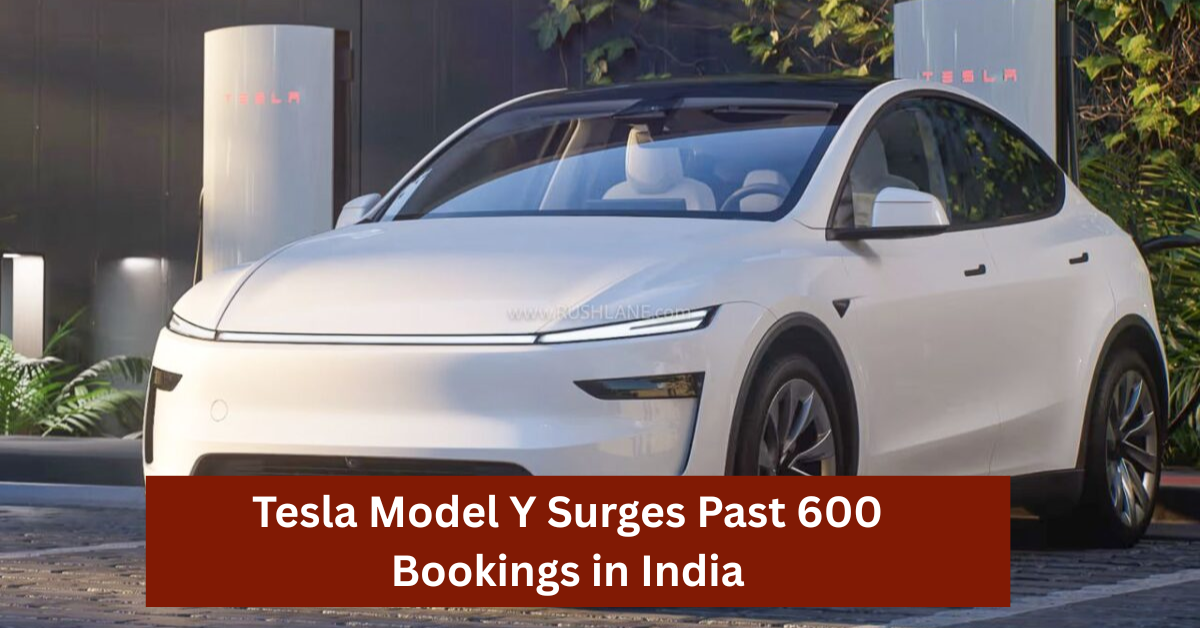As the electric vehicle (EV) market in India begins gaining unprecedented momentum, the Tesla Model Y has emerged as a frontrunner capturing the imagination of young and tech-savvy consumers. Since Tesla’s entry into India, anticipation has been steadily building, with eco-conscious drivers eager to embrace innovation combined with sustainability. The Model Y’s innovative features and performance capabilities have created a buzz unlike any other vehicle in the country.
The milestone of crossing 600 bookings recently marks a significant achievement not only for Tesla but also for the wider EV industry in India. This surge reflects shifting consumer preferences towards cleaner, smarter transportation solutions, highlighting the potential for rapid EV adoption among a youthful demographic. The Model Y’s success positions Tesla strongly as a key player shaping the future of mobility in the subcontinent.
Understanding the Tesla Model Y: What Makes It Special for Indian Consumers
The Tesla Model Y is a compact all-electric SUV known for combining impressive performance with cutting-edge technology. It offers a blend of long-range capabilities, fast acceleration, and advanced driver-assistance systems, making it ideal for urban and highway driving conditions common in India. The spacious interior and customizable options also appeal to families and tech enthusiasts alike.
Its battery efficiency and zero emissions speak directly to the growing environmental concerns of the younger generation. In a market still reliant on traditional combustion engines, the Model Y elevates the EV experience with features like Autopilot, over-the-air software updates, and an expansive touchscreen interface, differentiating it from competitors and fossil fuel alternatives.
Booking Trends and Demographics: Who Are Buying the Tesla Model Y in India
Analysis of recent booking data reveals key insights about who is driving this surge. A significant portion of bookings comes from metropolitan areas such as Delhi, Mumbai, Bengaluru, and Hyderabad, reflecting concentrated interest among urban professionals. The majority of customers fall into the 25–40 age bracket, signifying strong appeal for millennials and Gen Z buyers prioritizing technology and sustainability.
Early adopters tend to be tech-savvy, financially affluent, and climate-conscious individuals, balancing lifestyle aspirations with eco-friendly values. Many are also motivated by the prospect of lower running costs and government incentives for electric vehicles, further driving demand among consumers seeking long-term savings and environmental impact reduction.
Tesla Model Y Versus Competitors in the Indian Electric SUV Market
| Feature | Tesla Model Y | Competitor A | Competitor B |
|---|---|---|---|
| Driving Range | Long Range capable of over 300 miles | Approximately 250 miles | Approximately 200 miles |
| Acceleration (0-60 mph) | Approximately 4.8 seconds | 7 seconds | 8.5 seconds |
| Autonomous Driving Features | Advanced Autopilot included | Basic driver-assist | Limited features |
| Charging Infrastructure | Access to Tesla Supercharger network | Third-party fast chargers | Limited fast-charging options |
| Price Range | Premium segment | Mid-range | Entry-level |
This comparison illustrates how the Tesla Model Y stands out for performance, technology, and infrastructure support—even though it sits in a higher price bracket relative to local competitors. Tesla’s robust Supercharger network offers a major advantage for long-distance travel, enhancing convenience and alleviating range anxiety for users.
Government Policies and Their Impact on Tesla’s Bookings in India
India’s government has increasingly focused on supporting electric mobility through policy measures and incentives. Various state and national level subsidies, reduced taxation on EVs, and plans to develop charging infrastructure have created a more favorable environment for Tesla’s entry. These incentives help reduce the upfront cost, making vehicles like the Model Y more accessible to buyers.
Furthermore, initiatives promoting renewable energy and sustainable urban transport resonate with Tesla’s mission, aligning company goals with governmental priorities. The supportive regulatory framework accelerates EV adoption, drawing in a broader consumer base intrigued by the long-term benefits of electric vehicles.
The Role of Tesla’s Brand Power and Marketing Strategy in India
Tesla’s global reputation as a leader in innovation and sustainability adds significant allure for Indian consumers. The brand positions itself as more than a car maker—representing a lifestyle change that appeals to younger generations eager to embrace future technologies. Tesla leverages social media, influencer endorsements, and direct engagement through digital platforms to reach its target market efficiently.
The company’s decision to launch in India with online booking options and minimal dealership presence aligns well with emerging trends in how younger buyers research and purchase vehicles. By emphasizing transparency, quality, and cutting-edge technology, Tesla appeals to aspirational buyers looking beyond traditional vehicle purchasing experiences.
Challenges and Opportunities Ahead for Tesla in the Indian Market
While early booking numbers are promising, Tesla faces several challenges in fully capturing the Indian market. Infrastructure limitations, such as the current scarcity of charging stations outside major urban hubs, remain a hurdle. Import duties and high vehicle costs could affect affordability for many potential buyers.
On the other hand, growing environmental awareness, government backing, and increasing urbanization provide fertile ground for Tesla’s expansion. Collaborations with local firms, localized manufacturing plans, and continued technological advancements may unlock further growth opportunities. The EV sector in India is evolving rapidly, and Tesla’s model is poised to benefit from this transformation.
Future Outlook: What Tesla Model Y’s Success Means for India’s EV Landscape
The milestone of over 600 bookings for the Model Y underscores a significant shift in consumer mindset towards electric vehicles in India. It sets a precedent encouraging other international and domestic manufacturers to accelerate their own EV strategies, intensifying competition and innovation within the ecosystem.
This success also signals increased consumer confidence in EV technology, creating momentum for infrastructure development, policy enhancements, and ecosystem building. For younger Indians passionate about sustainability and technology, Tesla’s growing presence offers an exciting glimpse of the future of transportation in the country.
Conclusion
The Tesla Model Y crossing the 600 booking mark in India is more than just a sales figure; it represents the dawn of a new era for electric mobility. With its advanced features, brand appeal, and alignment with government policies, Model Y is well-positioned to lead the Indian EV market. As more young consumers embrace electric vehicles, Tesla’s journey in India will be closely watched as a bellwether for the country’s broader clean transportation ambitions.
India’s evolving automotive landscape combined with Tesla’s innovative approach presents an exciting opportunity to accelerate the adoption of sustainable mobility solutions. The Model Y’s strong early demand reflects a growing readiness among Indian buyers to invest in the future of transportation, marking a pivotal step toward a cleaner, smarter, and more connected India.




